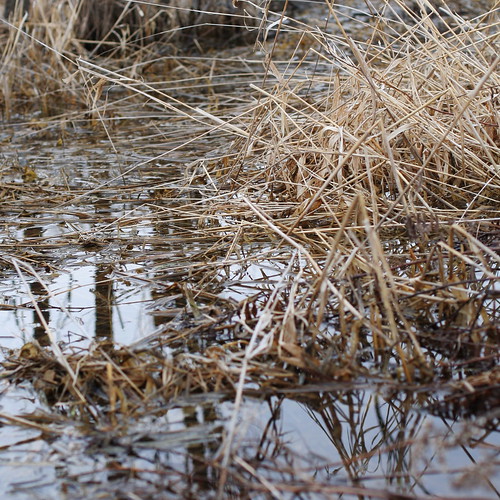Tuesday, March 27, 2007
Home of the peepers
The peepers are in full chorus in Wisconsin; their song comes from places like these...
I've added some info about these tuneful harbingers of spring in the comments section below.
Comments:
<< Home
I am so delighted to find your blog. Your photography is stunning (I do love those canyon pictures) and I am especially delighted to see photos of Madison, the city that I life in and love.
mixed media artist, thank you for the visit. Yes, Madison is a wonderful place!
Regina, your question prompted me to do a little research on these beloved harbingers of spring. Here are the most lively descriptions I found while Googling:
http://www.mdc.mo.gov/conmag/2001/03/50.htm
Walking in a country meadow one spring evening at dusk, you hear what sounds like thousands of tinkling sleigh bells. As you approach a pond, the sound grows louder, filling the air until you feel almost dizzy.
Sleigh bells? In March?
The sounds you hear are not bells, but male northern spring peepers calling for mates. When many peepers sing together, their high, piping whistles blend to sound like sleigh bells. If you had a flashlight, you might be able to spot some of the frogs, but they are only an inch long, and they hide themselves well.
Spring peepers are members of the treefrog family. Their toes have small, sticky pads that help them climb on low-growing plants. They also cling to grass blades and weed stalks near water's edge.
All frog and toad males, regardless of species, have breeding voices they use to attract mates. To make their calls, male toads and frogs close their mouths and noses and force air back and forth from their lungs to their mouths. The air passes over the vocal cords and creates a distinct sound. Balloon-like voice sacs help amplify the sounds. Some frogs can even call under water.
http://faq.gardenweb.com/faq/lists/neweng/2002041934021507.html
Near the end of winter, when New England gardeners are sick to death of snow and mud and dead vegetation, they despair of spring ever coming. The catalogs are worn, more plants have been ordered than the budget allows, yet the garden just sits and sulks. And so does the gardener, who can get unbearably whiny and pouty without green stuff to play with (just ask the spouse and family).
Then one night comes a chorus of "peeping" from the distant woods that brings hope into the heart, and knowledge that there WILL be a spring this year, and SOON! Even New Englanders who’ve lived in the middle of a city for 20 years will respond joyously to the words "WE HAVE PEEPERS!"
Post a Comment
Regina, your question prompted me to do a little research on these beloved harbingers of spring. Here are the most lively descriptions I found while Googling:
http://www.mdc.mo.gov/conmag/2001/03/50.htm
Walking in a country meadow one spring evening at dusk, you hear what sounds like thousands of tinkling sleigh bells. As you approach a pond, the sound grows louder, filling the air until you feel almost dizzy.
Sleigh bells? In March?
The sounds you hear are not bells, but male northern spring peepers calling for mates. When many peepers sing together, their high, piping whistles blend to sound like sleigh bells. If you had a flashlight, you might be able to spot some of the frogs, but they are only an inch long, and they hide themselves well.
Spring peepers are members of the treefrog family. Their toes have small, sticky pads that help them climb on low-growing plants. They also cling to grass blades and weed stalks near water's edge.
All frog and toad males, regardless of species, have breeding voices they use to attract mates. To make their calls, male toads and frogs close their mouths and noses and force air back and forth from their lungs to their mouths. The air passes over the vocal cords and creates a distinct sound. Balloon-like voice sacs help amplify the sounds. Some frogs can even call under water.
http://faq.gardenweb.com/faq/lists/neweng/2002041934021507.html
Near the end of winter, when New England gardeners are sick to death of snow and mud and dead vegetation, they despair of spring ever coming. The catalogs are worn, more plants have been ordered than the budget allows, yet the garden just sits and sulks. And so does the gardener, who can get unbearably whiny and pouty without green stuff to play with (just ask the spouse and family).
Then one night comes a chorus of "peeping" from the distant woods that brings hope into the heart, and knowledge that there WILL be a spring this year, and SOON! Even New Englanders who’ve lived in the middle of a city for 20 years will respond joyously to the words "WE HAVE PEEPERS!"
<< Home

